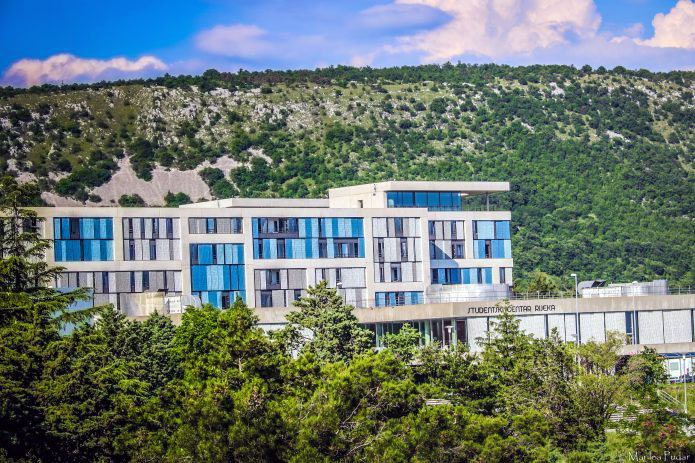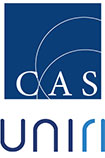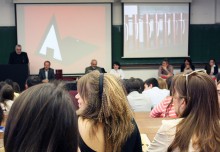
Između intelektulnog i čulnog rasuđivanja je kurs CAS-SEE centra Univerziteta u Rijeci sa temom ”Ka epistemologiji arhitekture”, koji će se održati u Inter-univerzitetskom centru (IUC) Dubrovnik od 11. do 16. septembra 2017. godine.
Between Intellectual And Sensory Reason
(Između intelektulnog i čulnog rasuđivanja)
Towards an Epistemology of Architecture
(Ka epistemologiji arhitekture)
11 – 16. septembar 2017.
Rukovodioci kursa:
Petar Bojanić, University of Belgrade, Serbia
Vladan Đokić, University of Belgrade, Serbia
Snježana Prijić Samaržija, University of Rijeka, Croatia
Idis Turato, University of Zagreb, Croatia
Joerg Gleiter, Technical University of Berlin, Germany
Iris Aravot, Technion, Haifa, Israel
Martin Düchs, University of Bamberg, Germany
Opis kursa / Course Description
Throughout the history of philosophy, architecture has been widely referred to as a metaphor for conscious action and logical construction. For Aristotle the work of the master builder served as a metaphor for his philosophy of action, while Nietzsche used the metaphor of a “shaking tower of concepts” to visualize and make more comprehensible the precarious state of metaphysics. Yet architecture means much more to philosophy and critical thought than what the explanatory use of architectural imagery evokes. It was Kant who went beyond metaphor by claiming “architectonics is the art of systems”. As such, architecture is not only a cultural practice based on knowledge but moreover a cultural practice that serves the production of philosophical knowledge.
This course focuses on the double bind of architecture as a material practice and an agent of knowledge production. We will discuss the importance of architecture in the formation of thought. It will draw attention to architecture as a cultural practice between intellectual reason and sensual reason. It was Nietzsche who already emphasized the close interrelation between philosophy and architecture and insisted on the philosopher’s need for appropriate spaces for thinking. He held that after the death of God “we need some recognition of what above all is lacking in our big cities: quiet and wide, expansive places for reflection. Places with long, high-ceilinged cloisters for bad or all too sunny weather”.
The course will raise the consciousness for the fact that it is through architecture that the sensual and the cognitive are bound together. As much as it is a material and spatial practice, architecture is an intellectual practice enabling man to experience aspects of our world that are usually disconnected: intellectual reason and sensory reason. How do these “places for reflection” look like, and moreover what do we expect these spaces to look like today in the information age.
Course instruction for students / participants
LINK: Apply for this course
http://cas.uniri.hr/between-intellectual-and-sensory-reason-towards-an-epistemology-of-architecture/
NOTE: Participants should prepare 20-minute-long presentations on topics of their research and allow a further 10 minutes for discussions following course descriptions. The titles of the presentations with short abstracts need to be sent following this link.
* ECTS points are available for MA and PhD students. The requirements for ECTS credits are (i) participation in at least 80% of all lectures, (ii) presentation of a previously prepared original paper on the topic of the course or discussion papers on the papers provided by lecturers. The organizers will prepare the official IUC certificate, which will include a detailed overview of the students’ obligations (sufficient for 3 ECTS). Whether ECTS will be recognized as parts of their academic programs or as additional achievements in diploma supplements depends solely on the institutions that the students come from.
Ako želite da pohađate ovaj kurs, molimo vas prijavite se na ovom linku: IUC Dubrovnik.
Šta je CAS-SEE?
CAS-SEE (Centar za napredne studije jugoistočne Evrope – Center for Advanced Studies of Southeastern Europe) je organizaciona jedinica Univerziteta u Rijeci koja je specijalizovana za naučna istraživanja u društvenim i humanističkim naukama.
Centar je zamišljen kao centar naučnih aktivnosti na visokom nivou, koji će podstaći javne rasprave od velikog društvenog značaja za region i Evropu.
Vizija Centra je da promoviše slobodu istraživanja i da obezbedi neophodne preduslove za inovativan, intelektualan i naučni razvoj, kao i jačanje transnacionalne i regionalne naučne saradnje u socijalnim pitanjima kao što su ljudska prava, pravda, demokratija i javna politika, kao i druga važna pitanja ljudskog suživota.
Centar je dobio snažnu podršku od Evropske mreže centara za napredne studije, i prva je regionalna, naučna ustanova koja je počela realizaciju punopravnog članstva u ovoj mreži.
CAS-SEE je dobio podršku Ministarstva nauke, obrazovanja i sporta Republike Hrvatske, i potvrđena je saradnja nekoliko naučnih ustanova u regionu (Slovenija, Bosna i Hercegovina, Srbija, Crna Gora, Makedonija i Turska).









